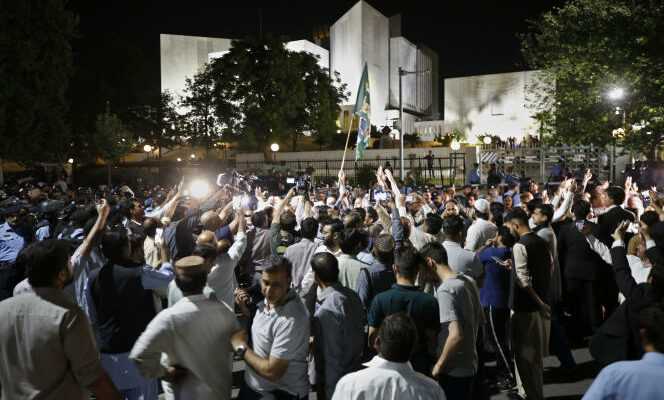Imran Khan’s maneuver to stay in power has failed. The Supreme Court inflicted on him, Thursday, April 7, a bitter setback. The Pakistani Prime Minister had tried to escape, four days earlier, a motion of no confidence from the opposition by refusing to register it for the vote, then by having the National Assembly dissolved and by organizing early general elections.
The five magistrates of the country’s highest court ruled, unanimously, that the scheme to prevent the vote of no confidence was unconstitutional and that all subsequent decisions were of no legal effect.
The National Assembly was restored, as well as the government. The former glory of cricket will therefore not escape the motion of censure, which must be presented on Saturday April 9, and will undoubtedly have to leave power. He lost his majority in the lower house of Parliament, victim of defections in his own ranks and within the coalition which had carried him in 2018 to the head of this country of 220 million inhabitants, endowed with the weapon nuclear. The Supreme Court’s decision was warmly welcomed by opposition supporters gathered in the capital, Islamabad.
The opposition, made up of the two great dynasties which have dominated Pakistani political life for years, the Sharif clan and the Butho clan, allied to a religious fundamentalist party, accuses him of being responsible for the major economic crisis that the country is going through. country. Debt, inflation and unemployment have considerably degraded the country’s activity and Imran Khan had to appeal to the International Monetary Fund. In recent days, the Pakistani rupee has plummeted. Shahbaz Sharif, the leader of the opposition in the National Assembly, is given as the possible successor of Khan.
At 69, the Prime Minister attempted a dangerous and inglorious coup. To justify his refusal to submit to a motion of no confidence, he accused the United States of being at the origin of an international conspiracy intended to bring him down, because of its links with China and Russia.
The promise of an “Islamic welfare state”
But Mr. Khan ended up tiring of his supporters and he lost the indispensable support of the military. Without a real backbone, he distinguished himself in his last months by his outbursts against India, a historic enemy, and against the West, in particular the United States and France. When the Muhammad cartoons were republished by Charlie Hebdo in the fall of 2020, after the assassination of Samuel Paty, the Pakistani leader had exacerbated the anti-French climate, accusing France and its president, Emmanuel Macron, of “offend the feelings of millions of Muslims” ; he had denounced “public statements based on ignorance” who “will fuel hatred and Islamophobia”. Pakistan was set ablaze at the call of an Islamist party which demanded the boycott of French products and the departure of the French ambassador. Instead of calming the spirits, Mr. Khan had played the arsonist not to be overwhelmed by the Islamists.
You have 42.43% of this article left to read. The following is for subscribers only.
